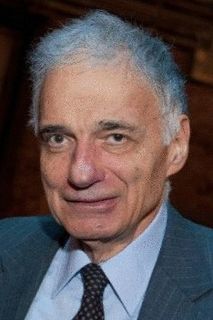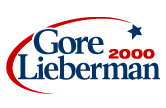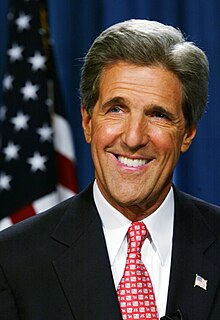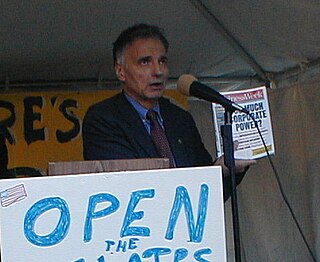Related Research Articles

Ralph Nader is an American political activist, author, lecturer, lawyer, and presidential candidate, noted for his involvement in consumer protection, environmentalism and government reform causes.

The 2000 United States presidential election was the 54th quadrennial presidential election, held on Tuesday, November 7, 2000. Republican candidate George W. Bush, the governor of Texas and eldest son of the 41st president, George H. W. Bush, won the election, defeating Democratic nominee Al Gore, the incumbent vice president. It was the fourth of five presidential elections in which the winning candidate lost the popular vote, and is considered one of the closest elections in US history.

The 1992 United States presidential election was the 52nd quadrennial presidential election, held on Tuesday, November 3, 1992. Democratic Governor Bill Clinton of Arkansas defeated incumbent Republican President George H. W. Bush, independent businessman Ross Perot of Texas, and a number of minor candidates.

The 1988 United States presidential election was the 51st quadrennial presidential election, held on Tuesday, November 8, 1988. Incumbent Republican Vice President George H. W. Bush defeated Democratic Massachusetts Governor Michael Dukakis. This was the first presidential election since 1940 in which a party won the presidency three consecutive times; as of 2020, it has not happened since.

The 2000 presidential campaign of George W. Bush, the 46th Governor of Texas, was formally launched on June 14, 1999 as Governor Bush, the eldest son of former President George H.W. Bush, announced his intention to seek the Republican Party nomination for the presidency of the United States in the 2000 presidential election.

The 2000 presidential campaign of Al Gore, the 45th Vice President of the United States under President Bill Clinton, began when he announced his candidacy for the presidency of the United States in Carthage, Tennessee, on June 16, 1999. Gore became the Democratic nominee for the 2000 presidential election on August 17, 2000.

The 2004 United States presidential election was the 55th quadrennial presidential election, held on Tuesday, November 2, 2004. The incumbent Republican President George W. Bush and his running mate Vice President Dick Cheney were elected to a second term, defeating the Democratic ticket of John Kerry, a United States Senator from Massachusetts and his running mate John Edwards, a United States Senator from North Carolina.

The 2000 United States presidential election in New York took place on November 7, 2000 as part of the 2000 United States presidential election. Voters chose 33 representatives, or electors to the Electoral College, who voted for president and vice president.

The 2004 United States presidential election in Iowa took place on November 2, 2004, and was part of the 2004 United States presidential election. Voters chose seven representatives, or electors to the Electoral College, who voted for president and vice president.

George Walker Bush is an American politician and businessman who served as the 43rd president of the United States from 2001 to 2009. A member of the Republican Party, he had previously served as the 46th governor of Texas from 1995 to 2000. Born into the Bush family, his father, George H. W. Bush, served as the 41st president of the United States from 1989 to 1993.

Albert Arnold Gore Jr. is an American politician and environmentalist who served as the 45th vice president of the United States from 1993 to 2001. Gore was Bill Clinton's running mate in their successful campaign in 1992, and the pair was re-elected in 1996. Near the end of Clinton's second term, Gore was selected as the Democratic nominee for the 2000 presidential election but lost the election in a very close race after a Florida recount. After his term as vice-president ended in 2001, Gore remained prominent as an author and environmental activist, whose work in climate change activism earned him the Nobel Peace Prize in 2007.

The 2004 United States presidential election in Michigan took place on November 2, 2004, and was part of the 2004 United States presidential election. Voters chose 17 representatives, or electors to the Electoral College, who voted for president and vice president.

The 2000 presidential campaign of Ralph Nader, political activist, author, lecturer and attorney, began on February 21, 2000. He cited "a crisis of democracy" as motivation to run. He ran in the 2000 United States presidential election as the nominee of the Green Party. He was also nominated by the Vermont Progressive Party and the United Citizens Party of South Carolina. The campaign marked Nader's second presidential bid as the Green nominee, and his third overall, having run as a write-in campaign in 1992 and a passive campaign on the Green ballot line in 1996.

As part of the 2000 United States presidential election the state of Missouri chose 11 electors to the Electoral College, who voted for president and vice president.

The Keys to the White House is a 1996 book about a prediction system for determining the outcome of presidential elections in the United States. The system, inspired by earthquake research, was developed in 1981 by American historian Allan Lichtman and Russian scientist Vladimir Keilis-Borok.
The PollyVote project uses the high-profile application of predicting U.S. presidential election results to demonstrate advances in forecasting research. The project is run by political science professors and forecasting experts, one of which is J. Scott Armstrong. All procedures, data, and results are fully disclosed and freely available online.
The Redskins Rule is a spurious relationship in which the results of National Football League (NFL) games correlated strongly with the results of subsequent United States presidential elections. Briefly stated, there was a strong correlation between the outcome of the last Washington Redskins home football game prior to the U.S. presidential election and the outcome of the election: when the Redskins won, the party of the incumbent president retained the presidency; when the Redskins lost, the opposition party won. This coincidence was noted by many sports and political commentators, used as a bellwether to predict the results of elections, and held true in every election from 1940 through 2000. A variant of the Redskins Rule was contrived to maintain the correlation through the 2008 election, after which it failed completely in the 2012 election, and later, the 2016 election.

Gallup was the first polling organization to conduct accurate opinion polling for United States presidential elections. Gallup polling has often been accurate in predicting the outcome of presidential elections and the margin of victory for the election winner. However, there were some close elections that it missed, such as 1948, 1976 and 2004, the popular vote in 2000 and 2016, and the likely voter numbers in 2012. The month section in the tables represents the month that the opinion poll was conducted in. D stands for the Democratic Party while R stands for the Republican Party. There were also some third parties included in some of these polls, such as the Dixiecrats and the Reform Party.
In political science, economic voting is a theoretical perspective which argues that voter behavior is heavily influenced by the economic conditions in their country at the time of the election. According to the classical form of this perspective, voters tend to vote more in favor of the incumbent candidate and party when the economy is doing well than when it is doing poorly. This view has been supported by considerable empirical evidence. There is a substantial literature which shows that across the world's democracies, economic conditions shape electoral outcomes.
References
- ↑ "Lewis-Beck, Michael S." Library of Congress Name Authority File. Retrieved 19 February 2019.
- ↑ "Lewis-Beck, Michael". SAGE Publications Inc (in Hindi). 15 February 2019. Retrieved 19 February 2019.
- ↑ "Past Editors". American Journal of Political Science. 21 May 2018. Retrieved 19 February 2019.
- ↑ Rosenbaum, David E. (1 April 1996). "POLITICS: THE ECONOMY; Can the President Capitalize On the Economy's Strength?". The New York Times. Retrieved 19 February 2019.
- 1 2 "Economic models predict Bush win - Aug. 23, 2004". CNN. 23 August 2004. Retrieved 19 February 2019.
- ↑ Gerstenzang, James (23 November 2007). "The president's economic challenge". Los Angeles Times. Retrieved 19 February 2019.
- ↑ Eisenhower, Karl (31 May 2000). "The Phony Science of Predicting Elections". Slate Magazine. Retrieved 19 February 2019.
- ↑ Kettle, Martin (1 September 2000). "It's President Gore, agree statisticians". The Guardian. Retrieved 19 February 2019.